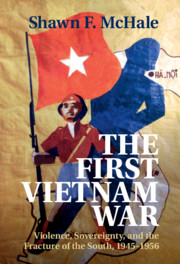3 results
8 - French Pacification Meets the Vietnamese Resistance
- from Part II - Disassemblage/Reassemblage, 1947–1953
-
- Book:
- The First Vietnam War
- Published online:
- 17 August 2021
- Print publication:
- 26 August 2021, pp 195-234
-
- Chapter
- Export citation
6 - Contesting State and Sovereignty
- from Part II - Disassemblage/Reassemblage, 1947–1953
-
- Book:
- The First Vietnam War
- Published online:
- 17 August 2021
- Print publication:
- 26 August 2021, pp 153-179
-
- Chapter
- Export citation

The First Vietnam War
-
- Published online:
- 17 August 2021
- Print publication:
- 26 August 2021

